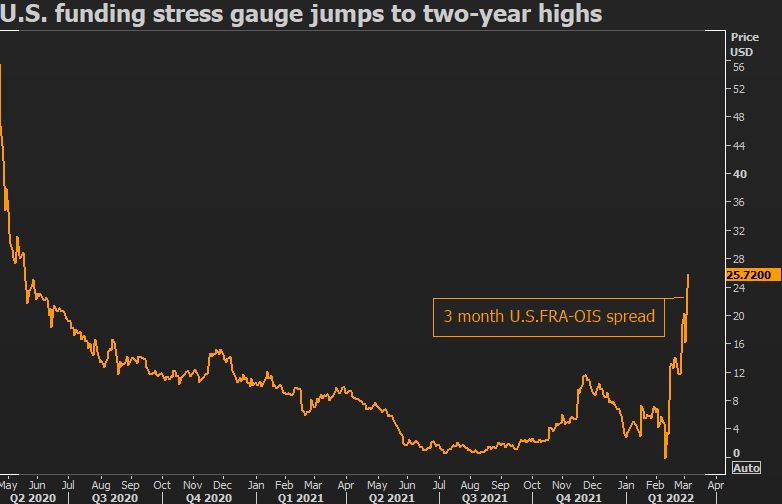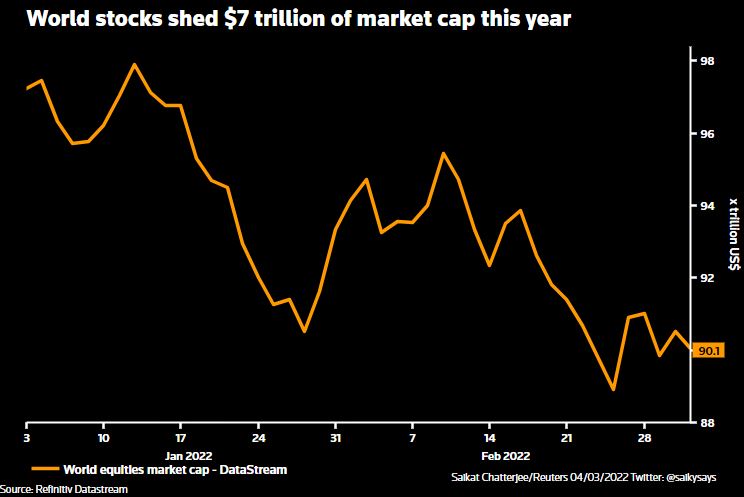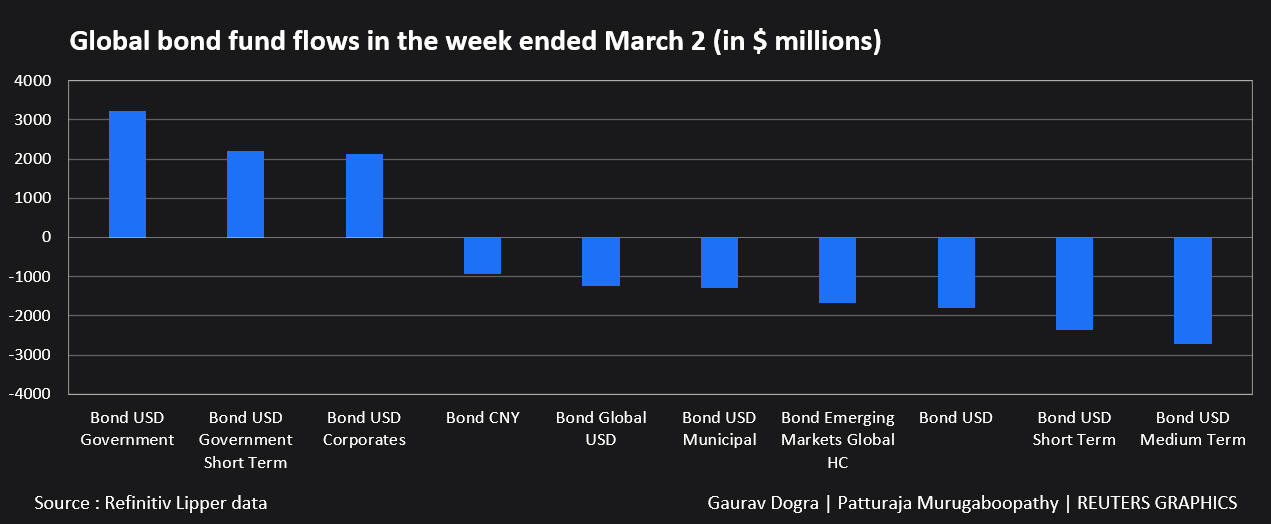NEW YORK/LONDON, March 4 (Reuters) – Data showing a red-hot U.S. jobs market sent Treasury yields lower and strengthened the dollar on Friday, but the war in Ukraine overshadowed the blowout report as the euro plunged on expectations of slower European economic growth.
U.S. job growth surged in February, pushing the unemployment rate down to a two-year low of 3.8% and employment just 2.1 million jobs below pre-pandemic levels.
The euro tumbled below $1.10 for the first time in almost two years and hit a fresh seven-year low against the Swiss franc as Russian forces seized the largest nuclear power plant in Europe after a building at the complex was set ablaze. read more
Register now for FREE unlimited access to Reuters.com
The dollar index rose 1.043% and the gap between yields on two- and 10-year Treasury notes , seen as an indicator of economic expectations, narrowed further to 25.6 basis points.
The two-year Treasury yield, which typically moves in step with interest rate expectations, fell 3.6 basis points to 1.50%, while the 10-year Treasury yield fell 9.3 basis points to 1.751%.
If it were not for Russia’s invasion of Ukraine, the Federal Reserve would likely raise interest rates by 50 basis points at its policy meeting in two weeks, said JJ Kinahan, chief market strategist at TD Ameritrade in Chicago.
But Ukraine is overshadowing everything, Kinahan said. “If Ukraine wasn’t out there this report would be telling us the economy is pretty red-hot … it is truly a blowout number.”
Fed Chair Jerome Powell said this week he would support a 25 basis-point rate increase and would be prepared to move more aggressively later if inflation does not abate as fast as expected. read more
Stocks sank to one-year lows in Europe while bonds, commodities and crude rallied as the escalating war in Ukraine raised concerns about slowing growth and faster inflation as investors bought up commodities as a hedge.
The STOXX (.STOXX) index of 600 European companies sank 2.5% to levels last seen a year ago and pushed the benchmark down 14% in correction territory, meaning 10% or more below its January record high.
Euro zone banks (.SX7P), whose exposures to Russia are being closely watched, sank 5%. MSCI’s all-country world index (.MIWD00000PUS) shed 1.8%, down just over 10% for the year.
On Wall Street, the Dow Jones Industrial Average (.DJI) fell 0.95%, the S&P 500 (.SPX) lost 0.99% and the Nasdaq Composite (.IXIC) dropped 0.97%.
Worries about how the war in Ukraine will develop rippled across asset classes. A closely watched measure of money-market stress and dollar funding conditions rose to its highest level since May 2020, reflecting the increased risk of banks hoarding the U.S. currency and squeezing liquidity.
Euro zone government bond yields fell along with the euro as investors worried that higher commodity prices will dent growth in the European Union. read more
“It shows how skittish things are and we are not in normal times,” said Mike Kelly, head of global multi-asset at PineBridge Investments.
The German stock market index DAX is reflected in a logo at the Frankfurt stock exchange in Frankfurt Germany, October 14, 2016. REUTERS/Kai Pfaffenbach
The euro was down 1.41% to $1.0908.

COMMODITIES ‘MELT-UP’
BofA said the widely tracked CRB commodity index has seen its strongest start to any year since 1915 amid worries over supplies from Russia, one of the world’s biggest exporters of raw materials. read more
Crude oil, which has hit its highest level in a decade this week, was set for its strongest weekly gains since mid 2020, while corn hit a 10-year high, with wheat futures up 40% on the week.
U.S. crude recently rose 5.5% to $113.59 a barrel and Brent was at $115.65, up 4.7% on the day.
Aluminium touched a fresh record high in London and is heading for its biggest weekly gain on record amid fears of a squeeze on the metal from Russia. Nickel reached an 11-year high for similar reasons.
“Skyrocketing inflation is what people fear and the best hedge for that is energy and industrial metals,” Kelly said.

CRUDE AND GOLD FIRM
Oil markets were also focused on whether the OPEC+ producers, including Saudi Arabia and Russia, would increase output from January.
U.S. gold futures gained 0.06% to $1,935.60 an ounce, eyeing their best weekly gain since May 2021.
MSCI’s broadest index of Asia-Pacific shares ex-Japan (.MIAPJ0000PUS) tumbled as much as 1.5% to 585.6, the lowest level since November 2020, taking the year-to-date losses to 7%.
Stock markets across Asia were in a sea of red, with Japan (.N225) losing 2.2%, South Korea 1.1%, China (.SSEC) 0.9% and Hong Kong 2.5% while commodities-heavy Australia (.AXJO) was down 0.6%.

Register now for FREE unlimited access to Reuters.com
Reporting by Herbert Lash; Additional reporting by Huw Jones, Anshuman Daga, Saikat Chatterjee and Sujata Rao; Editing by Chizu Nomiyama and Andrea Ricci
Our Standards: The Thomson Reuters Trust Principles.
